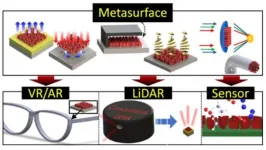(Press-News.org) Bottom Line: Engaging in administrative tasks to estimate costs or pay for care among a cohort of cancer patients and survivors was associated with an 18% increase in cost-related treatment delays or nonadherence.
Journal in Which the Study was Published: Cancer Epidemiology, Biomarkers & Prevention, a journal of the American Association for Cancer Research (AACR)
Author: Meredith Doherty, PhD, LCSW, an assistant professor at the University of Pennsylvania School of Social Policy & Practice (SP2)
Background: Navigating the U.S. health care system requires a complex set of communications between patients, health care providers, and insurance companies, Doherty said. She explained that the burden of learning about the costs of care and fixing billing errors often falls to the patients.
“It’s fairly unique to our U.S. health care system for the consumer to be responsible for acquiring the knowledge and skills needed to effectively use those goods or services and to ensure they’re of high quality,” Doherty said. “In the United States, health care is largely treated as a consumer product, so the onus is on the consumer.”
After years of hearing anecdotal evidence about patients’ frustration with the administrative complexities of the health care system, Doherty came across a study showing that U.S. health care users felt that administrative burdens significantly affected their care. Doherty sought to explore this phenomenon among cancer patients and further quantify the relationship between administrative tasks and treatment delays or nonadherence.
How the Study was Conducted: Doherty and colleagues used data from a cross-sectional survey performed by the nonprofit CancerCare that polled cancer patients and survivors about their engagement in payment-related administrative tasks and their experience with cost-associated treatment delays or nonadherence. Participants were asked if they never, rarely, sometimes, often, or always participated in the following activities during their cancer care:
Administrative burdens
Estimated the out-of-pocket costs before agreeing to treatment
Appealed a denial of benefits from the insurance company
Found out the out-of-pocket costs before filling a prescription
Asked insurance company for help understanding coverage
Found out the out-of-pocket cost before getting a lab test or scan
Treatment delay or nonadherence behaviors
Postponed or skipped doctor’s appointments
Postponed or skipped follow-up testing
Postponed or skipped blood work
Postponed or skipped filling prescriptions
Skipped doses of prescribed drugs
The 510 responses included in this study were selected to provide equal representation from major U.S. geographical regions (Northeast, Southeast, West, and Midwest). Half of the participant population was selected from patients or survivors who had breast, colorectal, lung, or prostate cancer; the other half was comprised of patients and survivors who had any other type of cancer.
Results: Participants engaged in an average of one administrative task and one delay or nonadherence behavior at a frequency of “sometimes” or higher. After adjusting for age, race/ethnicity, education, and monthly out-of-pocket costs, participants who engaged in any administrative tasks were 18% more likely to experience any treatment delays or nonadherence than participants who did not engage in administrative tasks. Engagement in each additional task was independently associated with an increase in treatment delays or nonadherence.
The survey showed that 55% of participants “never” or “rarely” engaged in any administrative tasks. Doherty and colleagues performed another analysis to better examine the effects of increasing administrative burden on the frequency of treatment delays or nonadherence. After adjusting for age and estimated monthly out-of-pocket care costs, each unit increase of administrative burden (additional tasks or increasing frequency) was associated with a 32% higher frequency of treatment delays or nonadherence.
While age, race/ethnicity, and monthly out-of-pocket costs were more strongly associated with treatment delays or nonadherence than administrative burden, Doherty and colleagues noted that African Americans were more likely to engage in administrative tasks and experience treatment delays or nonadherence than other racial and ethnic groups.
Author’s Comments: These data suggest that administrative burden may exacerbate existing health disparities among marginalized groups, Doherty said.
“For those who do engage, there’s frustration, exhaustion, and I think a sense of alienation. If you send me a bill erroneously and can’t help me correct it, you’re showing me you don’t care about me.”
Doherty hopes this work may help spur further studies and conversations about how to begin simplifying the system. “I think we’re at a place now where we may want to quantify how much improvement in outcomes we might see if we alleviated some of these administrative burdens,” she said.
Study Limitations: Limitations of this study include the use of a voluntary survey, which introduces the risk of selection bias and recall bias, especially among participants for whom more time passed between their cancer diagnosis and survey participation. The study did not include uninsured patients or stratify patients by insurance type, and it did not attempt to measure or account for health care literacy.
Funding & Disclosures: This study was funded by the American Cancer Society. Doherty declares no conflicts of interest.
END
Engaging in administrative payment tasks may correlate with treatment delays and nonadherence in cancer care
2023-08-30
ELSE PRESS RELEASES FROM THIS DATE:
Alcohol makes you more likely to approach attractive people but doesn’t make others seem better looking: Study
2023-08-30
PISCATAWAY, NJ — It’s “liquid courage,” not necessarily “beer goggles”: New research indicates that consuming alcohol makes you more likely to approach people you already find attractive but does not make others appear more attractive, according to a report in the Journal of Studies on Alcohol and Drugs.
The conventional wisdom of alcohol’s effects is that intoxication makes others seem better looking. But, according to the new study, this phenomenon has not been studied systematically. Earlier research typically ...
Lead service lines in New York City disproportionately impact Hispanic/Latino communities and children already at risk of lead exposure
2023-08-30
Results from a study just released by Columbia University Mailman School of Public Health show major inequities in the location of lead service lines across New York City. Communities with large numbers of Hispanic/Latino residents and those with children who are already highly vulnerable to lead exposure from numerous sources are disproportionately impacted by water service lines that may contain lead. The study findings are published online in the journal Environmental Health Perspectives.
There is no safe level of lead exposure for children. Even at lower levels of exposure, lead is associated with impaired cognitive function, attention-related behavioral problems, and diminished academic ...
Vision for future micro-optical technology based on metamaterials
2023-08-30
Metasurfaces, also known as invisibility cloak technology, are an artificial material adept at manipulating. With metasurfaces allowing for lenses to be reduced to one 10,000th the size of conventional lenses, they are generating considerable interest as optical components allowing miniaturization of optical systems for the next generation of virtual and augmented reality as well as LiDAR. If metasurfaces become commercially viable, overcoming the challenges of complex manufacturing processes and high production costs, Korea could gain a significant technological edge ...
No worries: online course to help you stop ruminating
2023-08-30
An online course designed to curb negative thinking has had strong results in helping people reduce the time they spend ruminating and worrying, a new study from UNSW Sydney has shown.
And researchers say the online course, which will soon be hosted on the Australian Government funded online clinic This Way Up and is free with a prescription from a clinician, was found to significantly improve the mental health of the people who participated in the study. The trial was part of a collaboration between UNSW, the Black Dog Institute and The Clinical Research Unit for Anxiety and Depression at St ...
Boosting neuroscience training to help children flourish
2023-08-30
Professionals working with children and young people will be offered training in brain science in an Australia-first initiative between The University of Queensland (UQ) and the Australian Research Alliance for Children and Youth (ARACY) through the Thriving Queensland Kids Partnership (TQKP).
Thriving Kids Brain Builders is a neuroscience translation initiative being developed with UQ’s Queensland Brain Institute (QBI) for people working across the health, education, social and community services, justice and housing sectors.
QBI ...
Exercise could help one of prostate cancer treatment’s most-common and devastating side effects
2023-08-30
Prostate cancer is one of the most common forms of cancer in the world, but not only does it put the lives of those diagnosed at risk, but can also severely impact patient quality of life due to side-effects of treatment.
One such side-effect commonly reported by patients is sexual dysfunction – however, a new long-term clinical trial led by Edith Cowan University (ECU) and presented at the American Society of Clinical Oncology Breakthrough Meeting in Japan, has revealed there is a therapy which may help combat this ...
Can this forest survive? Predicting forest death or recovery after drought
2023-08-30
How long can trees tolerate drought before the forest dies?
Researchers from UC Davis can now predict which forests could survive despite future drought. Their new method links precipitation to tree growth, and it can help people decide where to put their resources as climate change affects patterns of snow and rainfall that impact the health of forests.
“If a forest is doing OK, but in the future we know it’s likely to get only half the average rainfall it used to get, we can calculate the likelihood ...
How Norway is helping to restore humanity inside U.S. prisons
2023-08-30
As part of an innovative prison reform program, the Oregon State Penitentiary created a healing garden on its grounds to provide some respite from the concrete and resemble the outside world. One incarcerated man who had spent most of the past two decades in solitary confinement described going to the garden as, “the first time I walked on grass in 20 years.”
“Many of us have found beauty in weeds and flowers growing through the cracks in the pavement,” he told UC San Francisco researchers, who helped institute and then evaluated the reforms. “There is both beauty and inspiration in knowing that we, ...
Statistics can help us figure out how historic battles could have turned out differently, according to experts
2023-08-30
Quantifying Counterfactual Military History probes whether historic battles and military interventions could have turned out quite differently
Oxford, U.K., 30 August 2023 – Statistical methods can evaluate whether pivotal military events, like the Battle of Jutland, American involvement in the Vietnam war or the nuclear arms race, could’ve turned out otherwise, according to a new book.
Military historical narratives and statistical modelling bring fresh perspectives to the fore in ...
Using neuroscience to stop phantom braking
2023-08-29
EAST LANSING, Mich. — Recently, when customers began complaining that their vehicles with driver-assistance technologies were “phantom braking” or slamming on the brakes without any visible obstacles present, researchers at Michigan State University wanted to learn more about this phenomenon — why it happens and how to stop it.
“Frequent phantom braking incidents can erode confidence in autonomous driving technologies,” said Qiben Yan, an assistant professor in the College of Engineering. “If riders perceive the technology as unpredictable or unreliable, they’ll be less likely to embrace it.”
Autonomous vehicles have a vision system, ...




